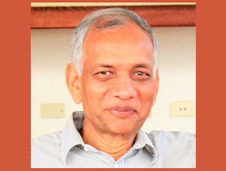
By NIMMI RAGHUNATHAN
NORWALK, CA – The Dharma Civilization Foundation made its case on the issue of the stunning cancellation of two chairs it had helped endow at the University of California, Irvine. The meeting at which its officials and supporters spoke was held by the Bharatiya Vichar Manch at the Sanatan Dharma temple on Apr.10.
NORWALK, CA – The Dharma Civilization Foundation made its case on the issue of the stunning cancellation of two chairs it had helped endow at the University of California, Irvine. The meeting at which its officials and supporters spoke was held by the Bharatiya Vichar Manch at the Sanatan Dharma temple on Apr.10.

Interestingly, the meeting began with the Manch presenting its antecedents through a power point, clearly delineating its affiliation to the Rashtriya Swayamsevak Sangh and the Hindu Swayamsevak Sangh. It was particularly noteworthy, as among the prime reasons UCI declined the $3 million for the two chairs was its charge that DCF had right wing attachments. When asked, DCF brushed that aside saying DCF was open to all and the lack of, or need for, RSS connections was not a point of consideration. The event itself, in which the primary speakers were DCF’s Chairman Emeritus Dr.Manohar Shinde and Executive Vice President Kalyan Vishwanathan, had a sympathetic audience where the duo explained in some detail how the UCI project had fallen through (for more background see IJ March 11 issue).
Several salient points emerged. The singular among them being that the Dean of the School of Humanities, Georges Van Den Abbeele had completely misled the donor group with assurances that were false and came to naught; it is possible that faculty not included in the decision to set up the chairs, were miffed and set the ball rolling in the matter of initiating action against it. Faculty who worked against the chairs, Vishwanath spelled out, were other Indian-Americans and provided names: Vinayak Chaturvedi, Alka Patel, Kavita Philip and R.Radhakrishnan.
Externally, DCF said, of the three petitions that were written against the chairs, it seemed very likely that the second one was not even worded at UCI but in all probability authored at the left-leaning Jawaharlal Nehru University, Delhi. It linked the lobbyists against the denial of visa to Narendra Modi to the US and the protestors against having him visit Silicon Valley as prime minister to the group that was behind the rejection of the UCI chairs and the current California textbook problem (See IJ April 1 issue).
The thing that rankles DCF the most is this: despite repeated requests, they were not allowed a hearing. The wish by a shocked DCF to meet with UCI were either summarily dismissed or coldly ignored. They were not heard so accommodations and adjustments could be made and the situation salvaged to suit all parties. The second aspect that DCF is deeply concerned about is the erosion of its credibility in academic circles and the tarring of its members with labels ranging from right wing to neo-fascist. UCI has charged DCF members of ‘intimidation’ which the soft-spoken Shinde says, he is befuddled by.
Shinde concedes that there was naiveté in DCF’s working and approach and more care should have been taken in the entire process. But lessons have been learned he said and vowed to forge ahead for the cause of India and education.
Going forward, Vishwanathan said DCF would temporarily suspend the setting up of chairs, ensure continued donor engagement and explore legal options vis-à-vis UCI. A lively Q&A followed with the two DCF speakers, donor and supporter Ravi Tilak, Trustees Sucheta Kapuria and Raj Kumar providing information and responses. Trustee Dr. VInod Ambastha facilitated the segment.
Several salient points emerged. The singular among them being that the Dean of the School of Humanities, Georges Van Den Abbeele had completely misled the donor group with assurances that were false and came to naught; it is possible that faculty not included in the decision to set up the chairs, were miffed and set the ball rolling in the matter of initiating action against it. Faculty who worked against the chairs, Vishwanath spelled out, were other Indian-Americans and provided names: Vinayak Chaturvedi, Alka Patel, Kavita Philip and R.Radhakrishnan.
Externally, DCF said, of the three petitions that were written against the chairs, it seemed very likely that the second one was not even worded at UCI but in all probability authored at the left-leaning Jawaharlal Nehru University, Delhi. It linked the lobbyists against the denial of visa to Narendra Modi to the US and the protestors against having him visit Silicon Valley as prime minister to the group that was behind the rejection of the UCI chairs and the current California textbook problem (See IJ April 1 issue).
The thing that rankles DCF the most is this: despite repeated requests, they were not allowed a hearing. The wish by a shocked DCF to meet with UCI were either summarily dismissed or coldly ignored. They were not heard so accommodations and adjustments could be made and the situation salvaged to suit all parties. The second aspect that DCF is deeply concerned about is the erosion of its credibility in academic circles and the tarring of its members with labels ranging from right wing to neo-fascist. UCI has charged DCF members of ‘intimidation’ which the soft-spoken Shinde says, he is befuddled by.
Shinde concedes that there was naiveté in DCF’s working and approach and more care should have been taken in the entire process. But lessons have been learned he said and vowed to forge ahead for the cause of India and education.
Going forward, Vishwanathan said DCF would temporarily suspend the setting up of chairs, ensure continued donor engagement and explore legal options vis-à-vis UCI. A lively Q&A followed with the two DCF speakers, donor and supporter Ravi Tilak, Trustees Sucheta Kapuria and Raj Kumar providing information and responses. Trustee Dr. VInod Ambastha facilitated the segment.

 RSS Feed
RSS Feed
